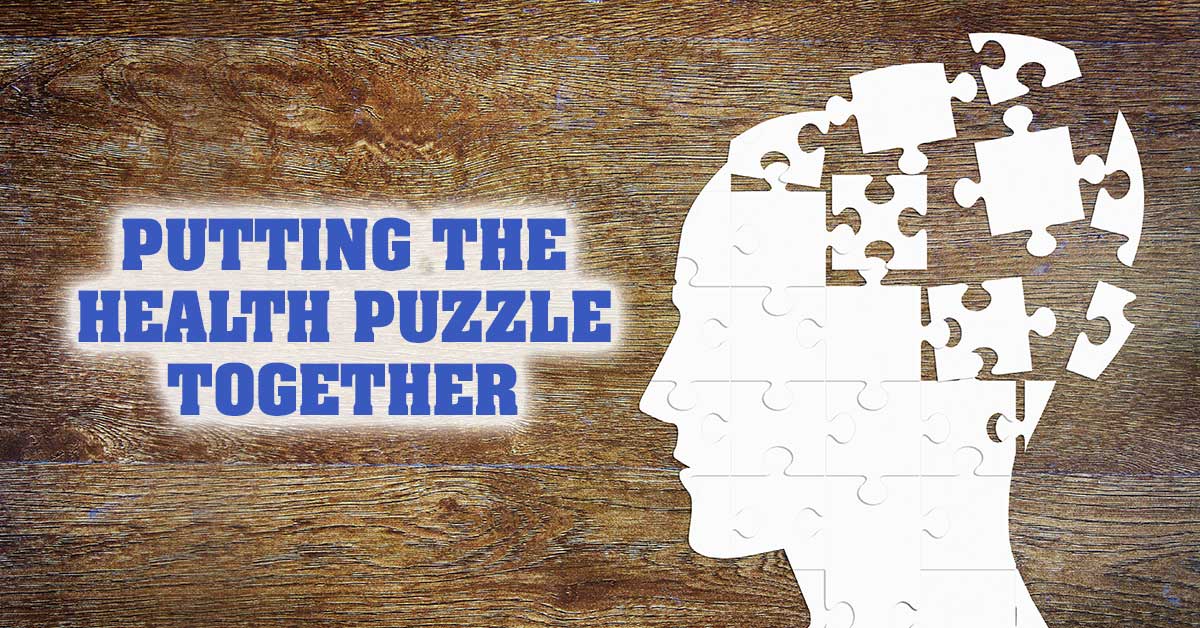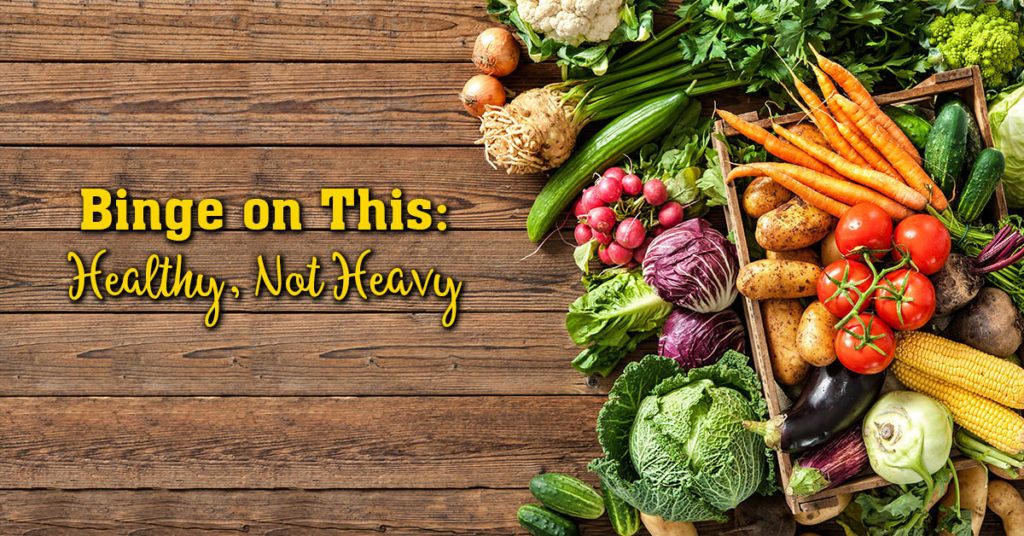PUTTING THE HEALTH PUZZLE TOGETHER

WORKING IN PERFECT HARMONY
Having a life worth living isn’t about one thing, it’s about a lot of things. Nutrition. Exercise. Balanced hormones. All working in synergy, a marriage of all that your body needs. The right mix is what makes us feel our best. A fail-safe formula for physical and mental success. But where do most of us fit into the equation? Uh…do we really have to say it? How do youapproach the conundrum? Do you control it, or does it control you? For all the fanfare of “Just Do It”, most people don’t. We don’t do it, we haven’t done it, we don’t even like thinking about doing it. So we put on a huge set of health blinders and go on our not-so-merry ways.
THE GOOD, THE BAD AND THE DEADLY
How and what we eat, is just a piece of the pie. Colorado has retained its crown as the least-obese state in America each year, but the state’s widening waistlines mean that superlative is in jeopardy. Eating well, well what does that mean exactly? How much food you need depends on many factors, including your height, age, sex, general state of health, job, leisure time activities, physical activities, genetics, body size, environmental factors, body composition and what medications you may be taking. But here’s the killer;studies link unhealthy eating to nearly half of American deaths caused by diabetes, strokes and heart disease. (Be still, my heart).
BURGERS BIGGER THAN PIKES PEAK
From burger bonanzas to bakeries to family restaurants to vending machines to movie theater concessions, our meals and snacks are taking on gargantuan proportions. “Normal”, seems skimpy. “Let’s go out for a bite”, is an oxymoron. (Not to mention nutritionally moronic.) We don’t eat plates of food, we inhale platters of it. The food scene is a malnutrition minefield loaded with calorie bombs, laden with lousy choices. (That we gobble up, no less.) Sugar. It’s everywhere. And it’s not so sweet when it comes to your health. Deep-fried, deep dish, deep trouble. Fast food is a fast way to die. The fast food industry in the united states is worth approximately 198.9 billion U.S. dollars. By 2020, this figure is forecasted to exceed 223 billion. Yet we love, and want to scarf it all.
FOR EVERY DUMB CHOICE, A SMART ONE
As we’ve said, bad nutrition can have more than a bad effect on every part of your body from head to toe. Just so you have it, below is a list that can feed your overall fitness:
- Eggs-protein
- Tomato sauce-heart
- Dried plums-bone density
- Walnuts-memory and coordination
- Brussel sprouts-cancer
- Apples-lung cancer
- Bok choy-bones, pms
- Steel cut oats-digestions
- Salmon- heart smart omega 3
- Avocados-healthy fat absorb other nutrients
- Canned pumpkin-cancer fighters
- Spinach-avoid blood clots, strong bones
- Cauliflower-cancer fighting
- Scallops-protein
- Collard greens-healthy eyes
- Olives-heart healthy
- Brown rice-build bones, convert food to energy
- Oysters-strong immune system
- Edamame-cholesterol lowering
- Strawberries-halt growth of cervical and colon cancer
- Kiwi-asthma wheezing
- Bran flakes-reduce inflammation, melt belly fat
- Sunflower seeds-heart health, fights infection
- Black beans-help arteries star relaxed and pliable
- Sardines-more than 100% Vitamin D and top source of omega 3
- Asparagus-bone building, diuretic
- Fat free milk-muscle building, ultimate energy drink
- Bananas-fiber, slimming
- Baked potato-more pressure lowering potassium than banana
- Flaxseed-may prevent endometrial and ovarian cancer
- Sweet potatoes-vision and immune system
- Greek yogurt-twice protein as regular
- Wheat germ-immune booster
- Dried tart cherries-control blood sugar, reduce insulin, lower cholesterol
- Green and black tea-prevent hardening of arteries
- Blackberries-more antioxidants than strawberries, cranberries or blueberries
- Peanut butter-keep blood vessels healthy
- Canola oil-heart healthy
- Blueberries-improve memory by protecting your brain from inflammation, boosts communication between brain cells
- Watercress-cancer fighting
- Barley-lowers cholesterol, helps control blood sugar
- Shitake mushrooms-as much d as glass of milk
Not that you’re supposed to dump the bunch into your grocery carts. Even incorporating a few, can help.
“I MEAN TO” MEANS SQUAT. (REAL SQUATS REQUIRED)
Exercise is another part of the mix. If overdoing it is a pain, not moving is a bigger pain. Yet 80 million people, aged six and older are physically inactive. What you should be focusing on is endurance, strength, balance and flexibility. Moving those fingers texting at lightning speed doesn’t count. And we spend four hours on our phones every day without even breaking a sweat. Exercise can be as simple as walking or swimming. Boring, you think? (Baloney. Which, by the way is something to dump from your diet.) There are plenty of options to keep the momentum going. Hula hoops, trampolines… kid-like, sure, but fun. (Which makes you stick with it.) But there’s a wild world of workouts out there today from high-flying bungee-assisted dance cardio classes to underwater spinning. From anti-gravity aerial yoga to circuit-based classes that will have you mimicking the hose-slinging, ax-swinging, and stair-climbing movements of firefighters. Whatever you do, your body will say, “Thanks, Sport”.
HOR-MOANS
OK, on to a big chunk of the health maze that might amaze you. Even if you seem to be doing everything (or anything, for that matter, right), hormones can really rake your health. Hormonal imbalances are literally becoming an epidemic in the western world. Cases of infertility, pms, lowered sex drive, impaired thyroid function, diabetes (which is a hormonal imbalance because insulin is a hormone) and irregular mensural cycles have become almost common place instead of being something that only a few people have to deal with. Both men and women can be affected by hormonal imbalances at any time in their lives, and if you or any one you know has ever dealt with such an imbalance, you know how disruptive it can be to a person’s state of well-being. Each hormone in our body has a specific job controlling every cell and organ. When these chemical messengers run rampant through your bloodstream, your entire body takes a serious hit.
AND AS AN ASIDE…
A lot of people think taking supplements can take care of all their woes. But whoa, wait a minute. Just where are they turning to scoop them up? Pharmacy aisles are filled with who-knows-what or what they really do, for that matter. There are big health food chains. Vitamin Shoppes (Yes, with two “p” s and an “e”.) Marketing mavens are beaming over their bottom lines. Then there are the millions of .com companies you’ve never heard of and know nothing about. Even Pinterest and Instagram get in on the game. You think “Amazon”, and think they must be good.
LOOKING FOR A REAL LIFE-CHANGER?
Look no further than Denver Hormone Health. No one gets the big picture better. Instead of a one-stop-shop that takes a one-size-fits-all approach to your overall health, they create tailored, integrated programs depending on what will make you feel your best. All their doctors are experienced in solving the complex puzzle of your unique needs. They start with simple tests that tell them where your hormones stand, and after addressing that, they work out a plan that is supplemented by nutrition and exercise. And as to real supplements, they are used to safely boost and enhance the rest of the program. And the supplements they use are from a company called Xymogen, a family-owned health sciences company with a quarter century of experience offering help and personal attention addressing issues from adrenal and cardiovascular support to immune system and gastrointestinal support. Whatever you need, Denver Hormone Health puts it all together. They help you get with a program and stick to it.
So make an appointment with Denver Hormone Health now.
It’s a win-win. Win. Win. Win.

